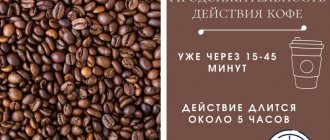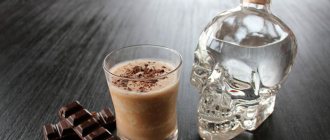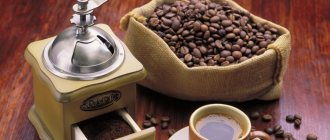Many athletes - both professionals and amateurs - cannot resist a cup of strong aromatic coffee before or after training. This is understandable: after all, caffeine has a significant effect on both the physical and emotional state of a person, toning them up, increasing concentration, strength and endurance. However, it cannot be said that the effect of drinking a tonic drink during sports training can definitely be assessed as positive. The benefits or harms of an invigorating drink depend on several factors.
Benefits of coffee before exercise
Coffee contains more than a hundred different components, so its consumption affects the biochemical processes occurring in the body. The main effect is exerted by caffeine, an alkaloid found in coffee beans and a stimulant of the central nervous system. This is why drinking the flavored drink causes increased alertness—most people respond to caffeine with increased energy and improved mood.
Drinking just one cup of coffee blocks the production of adenosine, a neurotransmitter that suppresses alertness and promotes sleep. The brain reacts to this by releasing adrenaline and dopamine, which cause a surge of energy.
Under the influence of caffeine in the body:
- heart rate accelerates;
- blood vessels narrow;
- blood pressure rises;
- metabolism accelerates;
- the work of the muscular system is stimulated;
- increased activity and concentration.
In addition, the production of adrenaline accelerates the release of fatty acids into the blood. During physical activity, muscles will use them as a source of energy, preserving valuable glycogen reserves.
If you drink coffee before training, then during it your endurance will increase and your ability to withstand the load for a longer time.
It has been proven that caffeine, by stimulating the release of adrenaline, can increase muscle strength and enhance muscle contraction. The feeling of physical tension is reduced, allowing you to perform more repetitions of exercises or lift more weight.
Scientific studies have shown that two cups of coffee (470 ml) increases training efficiency and performance by 22%. Strength indicators increase by 10%.
Thus, drinking coffee before physical activity will significantly increase the effectiveness of your workout, since caffeine:
- dulls the feeling of fatigue and increases performance;
- allows you to withstand aerobic exercise for a longer time;
- relieves muscle pain during strength exercises;
- increases testosterone levels (this hormone helps athletes gain muscle mass);
- stimulates the central nervous system, increasing activity, concentration on exercise technique and reaction speed.
Increasing the intensity of the workout increases the load on the muscles, which stimulates the growth of muscle mass and accelerates the burning of fat reserves.
Overall, drinking coffee before a workout can lead to better performance in sports. It’s no wonder that caffeine is included in many pre-workout complexes, sports supplements and fat burners.
What to eat after training: athlete's menu
All recommendations should be divided into two categories according to their objectives:
- to burn excess weight;
- for gaining weight and working on a sculpted body.
But there are common tips for any type of activity:
- Maintain a balance of nutrients. 50-60% are carbohydrates. With their help, you will fill the carbohydrate window that you created during exercise. Proteins should be up to 30%. These are the building blocks from which muscles are built. But this will not happen without the influence of fats, so the remaining 10-15% comes from lipids.
- Be careful about the quality of the products. Avoid fast food and processed foods. The best food is primary processed. Pasta and baked goods made only from durum wheat, possibly with the addition of bran; vegetables and fruits – fresh; meat and fish - not in the form of purchased minced meat, but in large pieces.
- Regardless of the purpose and method of exercise, after exerting force on the machines, take two meals. The first is a snack. It should consist of quickly digestible proteins and carbohydrates. This could be a candy bar or a glass of a protein shake. You need to drink it within half an hour. A full meal is after an hour and a half.
What can you eat after strength training for muscle growth?
In the first 30 minutes, it is necessary to close the anabolic window. Fast carbohydrates with a high glycemic index will help do this. Perhaps this is the only time when it is useful to use them. This way you will raise the level of insulin in the blood and prevent catabolic processes - the destruction of muscle mass.
You can eat:
- buckwheat, oatmeal, pearl barley, semolina or other porridge;
- rice;
- pasta from durum wheat;
- bran bread;
- as a complement to cereals - honey, butter, nuts, bananas and other high-carbohydrate fruits;
- freshly squeezed juice (watermelon and pomegranate will also help relieve muscle pain);
- cottage cheese and any other dairy products;
- poultry, pork, beef;
- fish;
- chicken or quail eggs.
What is the best thing to eat after a cardio workout?
If you want to lose weight, then you need to achieve a calorie deficit. Ideally, you should not eat for another 2-3 hours. But after jogging, be sure to drink a glass of clean water, this will temporarily suppress the feeling of hunger and allow the body to use fat reserves for energy. Metabolic processes will continue to rid the blood of released lipids for a long period.
When enough time has passed, you can eat:
- eggs or protein-rich lean meat;
- dried fruits – fresh fruits are best consumed before exercise;
- whole wheat bread;
- seafood, especially squid;
- low-fat yoghurts and cottage cheese;
- boiled or stewed vegetables.
You should exclude fast carbohydrates in the form of chocolates and bars and increase your fluid intake.
Fresh water and unsweetened green tea will do. Outdoor training requires more energy, so in winter athletes need to eat more and choose warm equipment. offers down jackets and overalls made from modern synthetic fabrics and innovative fillers that last a long time and do not wear out.
Harm and contraindications before training
Any stimulant can cause negative reactions from the body, especially when used in large doses. Individual intolerance to caffeine and allergic reactions may also occur. For some diseases, coffee is generally contraindicated, and drinking this generally healthy drink before training can cause unpredictable health consequences.
Do not consume caffeinated drinks or sports supplements before physical activity in the gym:
- with arterial hypertension;
- pregnant and lactating women;
- with increased nervous excitability;
- for stomach and duodenal ulcers and gastritis with high acidity;
- for severe vision pathologies, glaucoma.
People over 50 years old or with cardiovascular diseases should also abstain from the aromatic drink before training. In any case, the possibility of its use should be discussed with your doctor.
But even healthy athletes need to take into account that drinking coffee has side effects and can lead to adverse health consequences.
- When consumed on an empty stomach, it causes irritation of the gastric mucosa and can provoke the development of gastritis and ulcers, since caffeine increases the secretion of gastric juice.
- It negatively affects blood flow in the vessels, placing additional stress on the heart, and reduces the supply of oxygen to the organs.
- Causes a mild diuretic effect (acts as a diuretic). If there is a lack of fluid in the body, it leads to a disruption in the water-salt balance and increases the load on the kidneys.
- In women, it can lead to the formation of benign tumors in the mammary glands (mastopathy).
- Stimulates the intestinal muscles and acts as a mild laxative. Sometimes causes colic, diarrhea, and indigestion.
- Affects the absorption of drugs - reduces or, conversely, increases the absorption of some drugs.
- Increases anxiety and may cause depression.
Caffeine, as a stimulant, is addictive and addictive. To get an invigorating effect, you have to increase the amount of coffee consumed, which entails a number of negative health consequences.
Once the body gets used to caffeine, drinking a drink before playing sports will no longer increase performance and invigorate. Moreover, it can lead to rapid depletion of energy and cause a feeling of fatigue.
The dangers of caffeine before exercise
If even one small cup of coffee causes your heart to react too violently, drinking coffee before a workout is definitely not worth it, and in general you should think about consuming this drink. Maybe try switching to strong black tea?
Caffeine addiction is talked about in the same way as nicotine addiction. Of course, the harm is incomparably less, but the strength of the habit is approximately equal. Try not to give a coffee addict his favorite drink in the morning, and you will see how dependent a person becomes on this stimulant. In addition, as in the example with smokers, coffee lovers tend to increase the dose of the drink consumed over time, which clearly has a negative effect on the functioning of the heart.
In 2006, a specialized cardiology journal published material in which Swiss scientists stated that 250 mg of caffeine can significantly reduce blood flow to the heart during and after exercise. To function healthily during physical activity, your body requires a significant amount of oxygen and nutrients, so the heart experiences enormous stress, quickly pumping a large volume of blood. And drinking two cups of coffee reduces post-workout blood flow by 25%!
Moreover, these indicators turned out to be higher, the higher the altitude the experimental chamber simulated, about 40% for an altitude of 4000 m! If you live high above sea level or just climb regularly, be careful with your coffee.
In addition, coffee can cause an imbalance in water balance, which is especially important during and after training. This drink slows down the absorption of fluid from the intestines, which leads to dehydration and gastrointestinal disorders.
And with concentration, skeptics say, not everything is so rosy. Caffeine can stimulate brain function before exercise. You feel powerful and practically omnipotent, while you're just nervous and a little more focused. Whether to consider this a disadvantage is up to you to decide. For example, if you have a chess championship coming up, a cup of coffee will not be superfluous, but if you have a powerlifting triathlon ahead, we recommend weighing the pros and cons.
Why was this article written if everyone loves coffee so much? We also love its divine aroma and rich taste, but we advise you to think about what effect caffeine before a bodybuilding workout has on your body. Our common main goal is to create the perfect physique, and we sincerely wish you to remove all the barriers that prevent you from achieving this. And with problems providing cells with blood and nutrients during training, you will not only not get the desired result, but also cause significant damage to your heart.
How and how much can you drink coffee before training?
To ensure that drinking coffee before a workout has only a positive effect on the body and does not cause side effects, it is important to know how and how much it is recommended to drink it.
According to WHO recommendations, you can drink 300-500 mg of caffeine during the day without harm to your health. The norm is 3-5 mg/kg of weight. Depending on the type of coffee and the degree of roasting, one mug of this invigorating drink contains 80-120 mg of caffeine. This means that you can drink no more than 3 cups per day without fear of negative health consequences.
But the optimal doses of caffeine largely depend on the individual characteristics of the person and the frequency of consumption of the invigorating drink. When taken daily, even 400 g of caffeine is tolerated by the body almost unnoticeably. Some people, after drinking just one mug of coffee, experience symptoms of an overdose (rapid heartbeat, dizziness, high blood pressure).
In order for drinking an aromatic drink before fitness to have a stimulating and fat-burning effect, you need to drink 1-2 mugs 40 minutes before physical activity. At this dosage, it is safe for the nervous and cardiovascular systems and does not have a pronounced diuretic effect. You should drink coffee without sugar and cream - then it will contain a minimum of calories and have the desired effect on the body.
If you take it immediately before training in the gym, the drink will not have time to act - caffeine reaches its maximum concentration in the blood 40-50 minutes after consumption.
To increase the effectiveness of training and quick recovery, it is recommended to drink natural coffee, prepared in a coffee machine or brewed in a Turkish coffee machine. It is better to avoid instant drinks.
Frequent consumption of coffee in large doses (more than four mugs daily) negatively affects the body:
- Tolerance (addiction) to caffeine quickly sets in;
- signs of nervous system exhaustion appear (irritability, insomnia, causeless anxiety, depression);
- performance decreases;
- the risk of heart attack, stroke and early death increases (4 times);
- urinary incontinence may occur;
- the risk of developing gout increases.
To prevent addiction and reduce the effect of drinking coffee before training, you should drink it no more than twice a week. It is advisable to take a ten-day break after a month of regular consumption of the drink.
How long after training can you eat, and what to eat beforehand?
When you are actively exercising, you find the optimal period - before or after work, in the evening before bed, or 2-3 times a week, but in any case, you start exercising between meals.
Let's look at a few popular options.
Exercising or jogging early in the morning before breakfast
To this day, trainers argue about the usefulness of training on an empty stomach. A common belief is that there is little glycogen left after sleep, so the body will break down the fat layer
Opponents of this theory argue that morning exercise leads to muscle weakening.
If you choose this option, then you don’t need to eat anything at all before exercise, but you should drink a glass of clean water 15-20 minutes before starting. This rhythm is suitable for short runs and other moderate-intensity aerobic exercise. Strength complexes should not be performed before the first meal.
You can eat in 20-30 minutes. During this time, active processes of lipid breakdown will take place; you should not wait longer.
Workout in the morning after a light snack
If you feel that you cannot start exercising without a light breakfast, then give preference to small, but carbohydrate-rich portions. Good fit:
- bananas;
- cereal cookies;
- a piece of cheese with coffee;
- granola bar;
- a glass of medium-fat dairy products.
But such a menu should fit into 100-150 grams, so as not to create heaviness, but only to replenish strength.
It is better to eat a full breakfast 30 minutes after training, which will replenish the energy spent.
Exercise during the day, afternoon or evening
If you do not exercise in the morning, you should first make a snack of complex carbohydrates - cereals, fruits, vegetables - 1.5-2 hours beforehand. Many people believe that you need to give preference to proteins, but this is not entirely true - meat will weigh down your digestive system, but will not provide enough energy - it will be difficult for you to move, your strength will not last long. Protein foods are suitable for replenishing energy costs after exercise so that muscles do not lose their elasticity.
Is it possible to drink coffee after a workout?
Drinking coffee after intense strength or cardio exercise is not recommended. Physical activity is already a kind of stress for the body, which reacts with the release of adrenaline. Drinking coffee immediately after it will cause additional stress on the heart and blood vessels.
After training, it is recommended to drink coffee only 30-40 minutes later. An invigorating drink will give you strength and energize you when you are weak after exhausting exercise.
There is another advantage to drinking coffee after exercise - caffeine helps to minimize pain due to sore throat and recover muscles faster (according to research, by 48%).
WHICH IS BETTER TO DRINK GROUND OR INSTANT COFFEE
Statistically, instant coffee is preferred over ground coffee in most cases due to its economical price and ease of preparation. You don’t need any coffee machines, cones, unnecessary movements, and the taste, if you add sugar, is not particularly distinguishable. This, of course, is a controversial statement, because, as we know, sugar changes our sense of taste and the taste of a good strong black Americano is very difficult to taste. But true coffee lovers and connoisseurs of hot drinks will tell you - only in a coffee machine and only black, maybe sugar or a little cinnamon, but only ground coffee. Let's see the differences.
Instant coffee is a drink made from coffee beans that have undergone technological processing. Coffee connoisseurs will tell you with confidence that drinking this kind of coffee is not respecting yourself. And they will be right, because natural ground coffee is much healthier, more aromatic and tastier. It contains all the important properties that we wrote about above. And excellent vigor, and benefits for weight loss, and a bright rich aroma and taste.
The real beans from which ground coffee is obtained are grown on plantations. There are two types of coffee:
- Arabica
- Robusta
Arabica is the most popular type and the most expensive. Many people love the wonderful taste of 100% Arabica coffee, for example, Bongiorno Premium from Colombia. It is curious that the finished Arabica drink has virtually no odor.
At the same time, Robusta is recognized as less rich, but it contains more caffeine and is more invigorating. It is the presence of Robusta in the composition that helps us feel vivacity, and at the same time the bitter taste; it is often used for espresso. The average type of ground coffee is a mixture of Arabica and Robusta, such as in Bongiorno Alongsi. Depending on the proportions, aromas, richness of taste, bitterness and, of course, the price category change.
One way or another, you have to work hard to get natural coffee. Thousands of people work hard to ensure that you can enjoy one small cup of natural coffee. But its taste, color, rich aroma are a pleasure of a separate level. Your mood immediately improves and optimism moves with you.
What is better coffee or caffeine tablets?
Instead of coffee, you can take 2-3 tablets of caffeine sodium benzoate to increase the effectiveness of your workout. One tablet contains 40 g of caffeine and 60 g of the excipient sodium benzoate, which enhances the solubility and absorption of the active component. This is the only caffeine-containing drug that is available in pharmacies without a prescription.
Scientific research has not yet revealed which source of caffeine is better: natural coffee or synthetic tablets. Each organism is individual, so only through experimentation can you find out which one has a greater stimulating effect and is right for you.
Caffeine tablets will be a real lifesaver for those who for some reason do not like drinking coffee, but want to increase muscle strength, endurance and lose weight faster.
Bottom line
Is it possible to drink coffee before training? Taking into account all the advantages - yes. True, there is one nuance related to training time. Caffeine remains in the body for 4 to 6 hours after consumption, stimulating the nervous system. So if you trained at 8-9 pm after a cup of coffee, you can easily experience problems sleeping.
Short sleep can cause a whole series of negative effects, such as decreased testosterone and increased cortisol. Eventually, the benefits of caffeine will wear off. Conclusion - caffeine is much better suited for morning and afternoon workouts than for evening trips to the gym.
Coffee before exercise for weight loss
Recent studies confirm that drinking coffee in combination with exercise helps you lose weight faster. Caffeine speeds up metabolism and has fat-burning properties: it promotes the release of fatty acids from adipose tissue into the blood, which is then oxidized in the muscles during exercise. In addition, it regulates blood sugar levels, improves insulin sensitivity and reduces hunger.
To lose weight, you need to drink 1-2 cups of a freshly brewed drink without sugar and cream (you can add a little milk) 30 minutes before cardio or strength training.
Harvard scientists have found that green coffee promotes weight loss to a greater extent than black coffee. The average weight loss in the subjects over 3 months was 5.5 and 3 kg, respectively.
The effect of caffeine on the human body
Caffeine and cortisol are known to act as vasoconstrictors , meaning they cause blood vessels to narrow, thereby restricting blood flow throughout the body. This has the greatest impact on skeletal muscles and the delivery of nutrients such as oxygen, glucose, amino acids. In addition, blood pressure increases.
Vasoconstriction does not affect performance, but it may affect the rate at which muscle tissue recovers. In addition, it can be reduced to a vasodilatory effect caused by working muscles.
Caffeine is a known diuretic , which means that when you consume it, the body loses a lot of water. It is filtered in the kidneys and excreted into the bladder. You have to be careful or it may lead to dehydration. And dehydration can have a negative impact on physical performance, so you should make sure your body is getting enough water during exercise.
Caffeine is a good antioxidant, thereby combating the production of free radicals in the body. Some argue that muscles need radical damage to stimulate growth and repair, and this is true to some extent.
After all, radicals are a natural part of exercise. To neutralize them, the body will need more than 1000 mg of vitamin C, this is impossible. Then caffeine comes to the rescue, although a few milligrams of this substance will not be able to rid the body of all these radicals, but they still provide some radical protection.
The effect of coffee on the human body
What can replace coffee?
Coffee is a rich, but not the only source of caffeine. This substance is contained in considerable quantities:
- energy drinks – up to 100 mg per 150 ml;
- in tea leaves – 60 mg per cup of black tea and 75 g of green;
- Coca-Cola – 40 mg.
Most thermogenic sports supplements also contain caffeine. There is even protein-enriched coffee (Protein Coffee from Scitec Nutrition) for making a nutritional shake for bodybuilders. One dose of the drink contains 27 g of protein and 100 mg of caffeine.
In addition to coffee to increase endurance and muscle strength, you can consume caffeinated sports nutrition and energy drinks before strength training to gain muscle mass. To lose weight, instead of coffee, it is better to drink a cup of strong tea before physical activity.
Menu: meal plan
Regardless of the goal of training (weight loss or weight gain), you will need to switch to proper nutrition, which performs several functions:
- normalization of metabolism;
- normalization of sugar and cholesterol;
- elimination of fat layer;
- muscle strengthening;
- creating a beautiful relief on the body;
- increasing endurance and physical strength.
It is impossible to eat only hamburgers and have a beautiful figure. However, proper nutrition does not mean giving up delicious foods. There are a huge number of recipes for preparing delicious and healthy food. For example, you can make your favorite hamburger yourself using homemade tomato paste and mayonnaise, boiled meat, and bran bread.
When creating a menu, use a few useful tips
:
- Eat small meals, 5-6 times a day in small portions. This way, food is digested easier and faster, and enough calories are supplied to eliminate the feeling of hunger for a long time.
- Count the calories you eat
. To lose weight, a woman needs to consume from 1500 to 2000 calories per day, a man – from 1800 to 2300 calories. To gain muscle mass, a woman needs from 2000 to 2200 calories, a man - from 2300 to 2600 calories. - Don't give up fat. A balanced diet involves consuming 50% carbohydrates, 25% proteins and 25% fats. To lose weight, the norm of carbohydrates and fats is reduced - 40% and 15%, respectively.
- For snacks, use low-calorie foods - vegetables, fruits, dairy products.
- Avoid alcohol. Any type of alcoholic beverages negatively affects the process of losing weight and gaining muscle mass. A small amount of dry red wine is allowed.
- Avoid sugar and flour dishes. These products slow down metabolism, which is unacceptable for an active person.
By following these rules, you can create a menu consisting only of healthy foods.
Return to article content
Breakfast
Breakfast gives the body energy for the whole day, so you shouldn’t skip it. The first meal should take place within an hour of waking up so that the body does not trigger the energy-saving mechanism and does not begin to accumulate fat.
For breakfast you need to eat carbohydrates, fiber and proteins. A small amount of whole grain bread is allowed.
Here are some delicious and nutritious breakfast options:
- Buckwheat porridge with milk, toast with cheese, green tea. A glass of milk (second breakfast)
. - Oatmeal in water with dried fruits, coffee. Natural yogurt, apple
(second breakfast). - Baked cottage cheese pancakes with sour cream, fermented baked milk. Banana (second breakfast).
After second breakfast, you can snack on nuts, a piece of cheese, or any vegetable.
Return to article content
Dinner
Lunch should be hearty and nutritious, containing fats and proteins. The main thing is to chew your food thoroughly and take your time. Ideal lunch option - soup, main course
and a drink that should be consumed 30 minutes after eating.
Here are some menu options:
- Mushroom soup with potatoes, pasta with minced meat, tea with toast.
- Broccoli puree soup, chicken breast baked with zucchini, dried fruit compote.
- Fish soup, rice with salmon, vegetable salad, green tea.
- Borscht in vegetable broth, steamed chicken cutlet, mashed potatoes, freshly squeezed juice.
Return to article content
Dinner
Dinner should be light and low in calories. For example, 100 g chicken, salad
from vegetables, tea. This is enough to satiate and eliminate the feeling of hunger until the morning.
Like breakfast, the first meal is taken at approximately 18:00, the second - 2 hours before bedtime. Dinner options:
- Chicken fillet, vinaigrette, black tea. Late dinner - natural yogurt.
- Zucchini stuffed with rabbit meat, compote. Second dinner - kefir.
- Fish casserole, cucumber and tomato salad, berry smoothie. Late dinner - fermented baked milk.
Return to article content
Myths about coffee
Due to the popularity of coffee and its ambiguous effect on the body, people have many different myths about this drink. Recent scientific research has refuted most of them.
Myth No. 1. Coffee causes drug addiction
The legend that coffee is very difficult to give up does not stand up to criticism. An attachment to the drug certainly arises, but it cannot be called an addiction. If you gradually reduce the dose of caffeine, bringing the consumption to several sips a day, then the body will get used to it, and giving up your favorite drink completely will not be difficult. There will be no withdrawal or breakdowns in the future.
Myth No. 2. Drinking caffeinated drinks disrupts your sleep.
Insomnia from drinking coffee can occur if you drink 2-3 cups of strong drink at night (3-4 hours before going to bed). Drinking coffee in the morning or before an afternoon workout at the gym will not affect your sleep in any way.
Myth No. 3. Instant coffee is harmful
Instant coffee drink lacks almost all beneficial substances and contains much less caffeine than freshly brewed natural coffee. It will not provide much health benefit and will not significantly improve the effectiveness of your workout if you drink it half an hour before it. But we cannot talk about any harm to the body.
Myth No. 4. Coffee provokes the development of osteoporosis
Excessive amounts of caffeine can actually cause calcium to drain from your bones. But this amount can easily be compensated by drinking only 2-3 tablespoons of milk. So, drinking coffee with milk reduces the risk of osteoporosis.
Myth No. 5. Coffee greatly increases blood pressure.
In fact, with regular coffee consumption, the blood pressure monitor readings do not change at all. The pressure may increase by 10-20 mmHg. in the next 1-2 hours after taking it only if you drink the aromatic drink no more than 1-2 times a month or after a long break.
Thus, most myths are fiction, and scientific research does not support them with facts or refute them completely. What has actually been proven by scientists is that caffeine, when consumed in the right dosages and at the right time, helps increase the effectiveness of sports or fitness, gain muscle mass or lose weight faster.
You cannot consider the drink magical and completely rely on it alone - drinking coffee without following the rules of nutrition and physical activity will not affect your figure.
How nutrition shapes our body
What we eat determines how we look. Most of the population is unhappy with what the mirror reflects, and there are two categories of people:
- those who want to lose excess weight;
- looking to gain muscle mass.
How fat loss and gain occurs
In the battle between the scale dial and delicious buns, calories are decisive. These are units of energy. Our body needs a charge to set all parts of the body in motion, to continue the non-stop work of all internal organs, we take it from food. Previously, during the period of difficult food production, a person needed more strength for daily work - for cultivating the land, for long walks. At the same time, the products were often low in calories - vegetables and fruits, vegetable oil.
Modern life simultaneously improved conditions in two directions:
- Daily energy consumption decreased - transport appeared, an elevator and an escalator were designed. To avoid unnecessary movements, they even created a remote control. Working in an office at a computer practically does not disturb a person’s state of rest.
- The calorie content in purchased provisions has increased - candy, cakes, fast food, carbonated sweet drinks - these are just time bombs in packaging. One bar of chocolate contains one fourth of the daily food requirement, despite the fact that we usually eat it with tea for dessert. And few people are interested in fruits in their pure form anymore - it’s more economical and convenient to buy juice, which contains a lot of sugar.
These two trends have led to an oversupply of unspent calories.
They are perceived by the body as reserves and are converted into fat reserves. To get rid of this safety net of fat, you need to create an energy deficit, that is, spend more than you take in. Then you will have to use up your reserves. This can be achieved in the following ways:
- Train a lot, while choosing aerobic exercise, that is, cardio exercises of moderate difficulty. This allows glucose to be taken out of cells using oxygen. You can achieve a more effective anaerobic threshold, but then the exercises will be too intense for the cardiovascular system and an unprepared person in general.
- Reduce your diet - don’t eat after 6, monitor the amount of calories, create deficit conditions for the body.
But the most effective way is to combine these two methods, that is, increase consumption and reduce energy supply.
However, this must be done gradually so that the shaking is not perceived as stress, otherwise the reverse process may occur. Instead of giving away fat reserves, the body will fight for every deposit. In winter, watch out for sportswear, choose ski suits from the Stayer brand. Due to the cost of heating the body, the energy balance may be disrupted, not to mention the fact that you may simply get sick. Dress warmly and comfortably during the winter season.
Coffee before exercise: positive effects
Those who closely monitor the number of daily calories will be pleased to know that coffee without sugar, cream or milk is completely calorie-free. That is why, before training in the gym for the purpose of losing weight, you can allow yourself a cup of aromatic drink to speed up your metabolism.
Before endurance training, a small dose of caffeine can really help you last as long as possible. A moderate portion will really have a positive effect on performance and give you more strength. It is for this reason that coffee, as a source of caffeine, was included in the list of prohibited foods before participating in sports competitions.
High-quality sports training can be combined with coffee, adhering to its consumption standards to improve concentration and stimulate the nervous system. A small cup of drink can be seen as the beginning of a warm-up, easing the transition to hard work.
It is believed that caffeine can not only invigorate and set you up for long-term work, but also relieve pain, reducing muscle fatigue during strength training. There is another theory, according to which it is coffee that becomes an obstacle to the normal process of muscle recovery after training, which puts a taboo on its consumption within two hours after exercise. Both theories have not yet been confirmed.
You might be interested in: The benefits and harms of ground coffee
Just one cup of coffee can give you strength during grueling anaerobic exercise, while two cups will have a more significant impact on athletic performance, but with a health risk.
It is believed that drinking coffee before running, swimming, or cycling can be beneficial for your health and performance. The main thing is to correctly regulate its amount, taking into account weight indicators.
You should adhere to the following formula: 0.5-1.4 mg of caffeine per 1 kg of weight. One cup of espresso contains 100 mg of caffeine, a little less in an Americano - 80 mg.
Caffeine after exercise: the pros and cons
Training in itself is stressful for the body, so everything said earlier to some extent applies to whether you can drink coffee after training. A strong surge of adrenaline, spurred by additional artificial administration of a drink or tablet with caffeine, can lead to disastrous consequences.
- Drinking coffee immediately after a workout strains the heart. An attack of hypertension - a surge in pressure - is easily provoked by such actions.
- The effect of the drink will not only be lost; when it ends, the consequences will be even stronger, and the person will feel tired and exhausted twice as much.
But there are some advantages that would not hurt to take into account. Coffee helps well after a workout for weight loss. The main thing is to correctly assess the condition, take into account the training time, your preparation, load and the rest.
Drink or pills
Manufacturers of sports nutrition and dietary supplements have even developed special coffee products. They are healthy thanks to the combination of natural grains, nourishing oils, essential vitamins and biologically active ingredients.
Caffeine in the drink and in the dosage form have the same effect. Each tool has its own advantages and disadvantages. The tablet form allows you to accurately calculate the dosage and change it depending on how you feel, finding the golden mean just for yourself. But there is only caffeine, without the microelements inherent in the grain product. And you won’t get any pleasure from taking the medicine.
Natural espresso is drunk before exercise by those who highly value the taste and aroma of the drink and simply want to combine business with pleasure. In addition, with coffee we get B vitamins, magnesium, sodium, iron, potassium and other beneficial substances.











